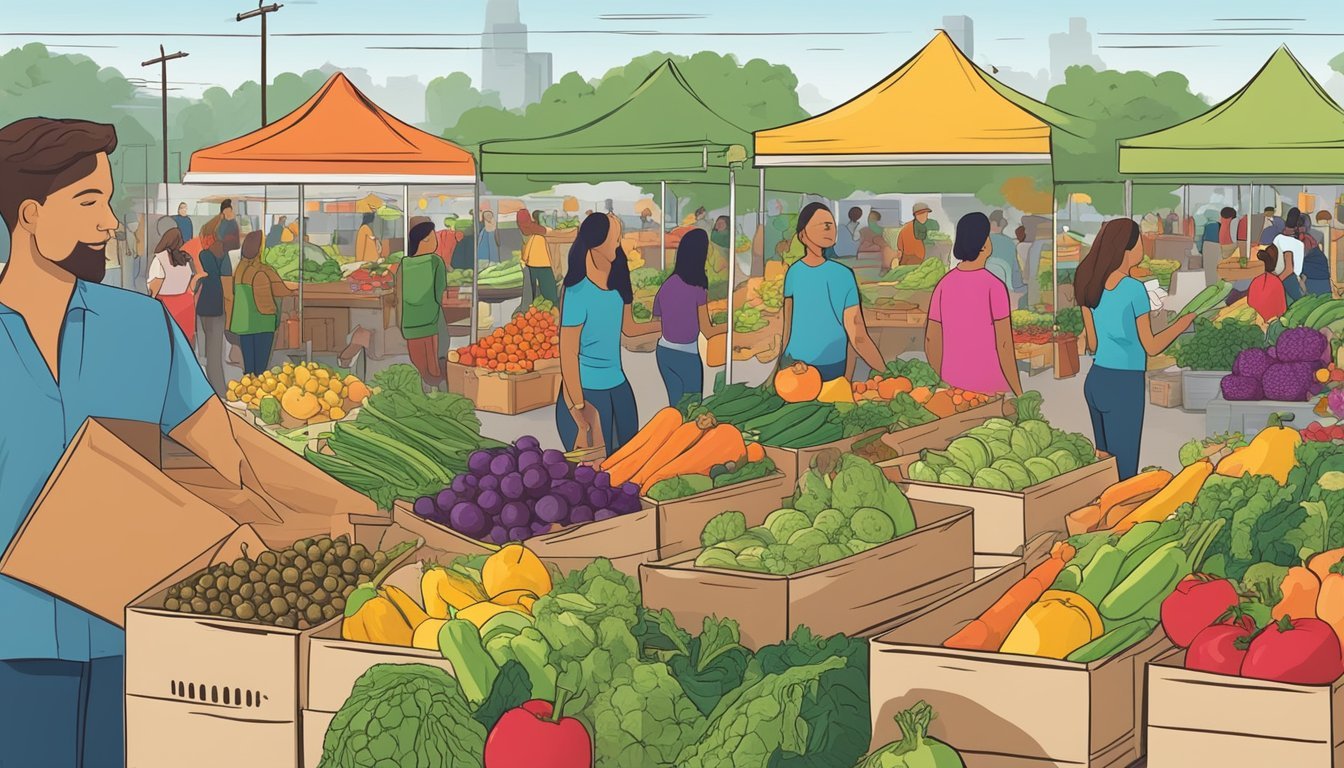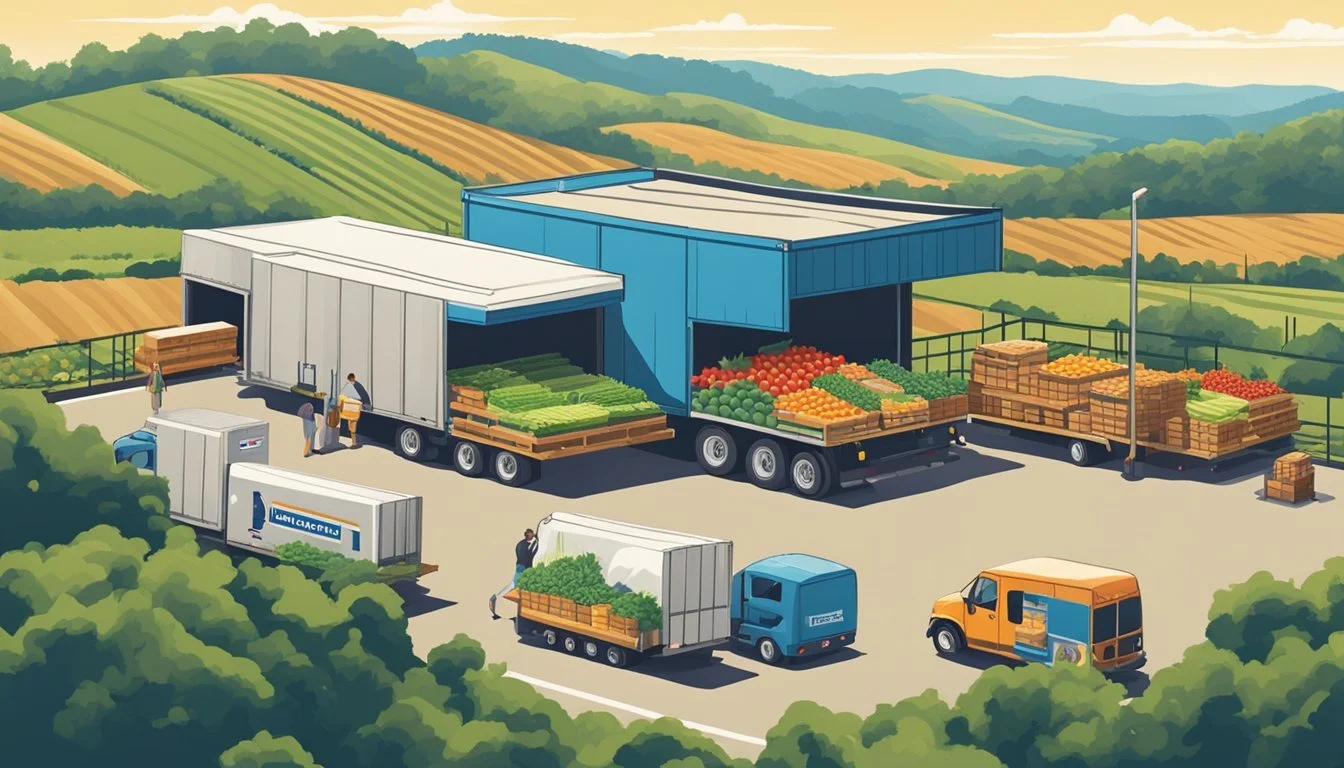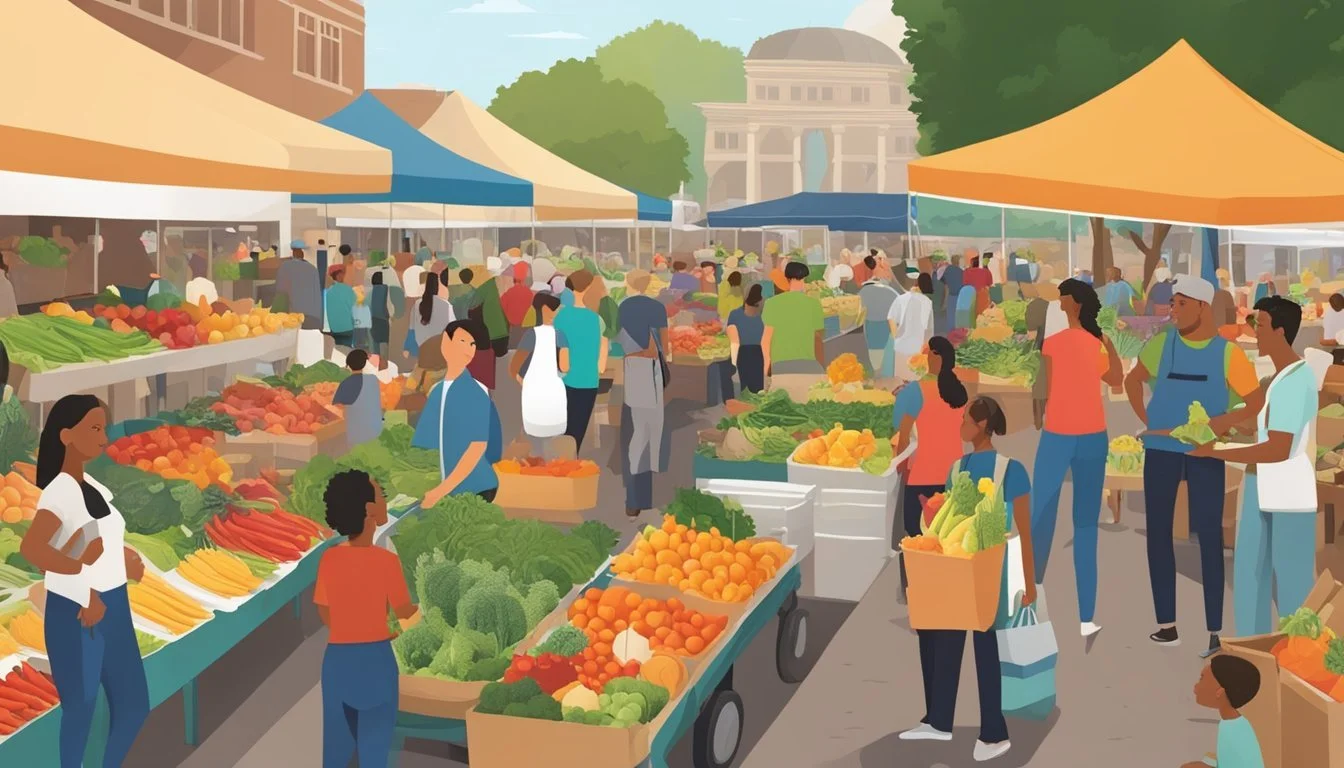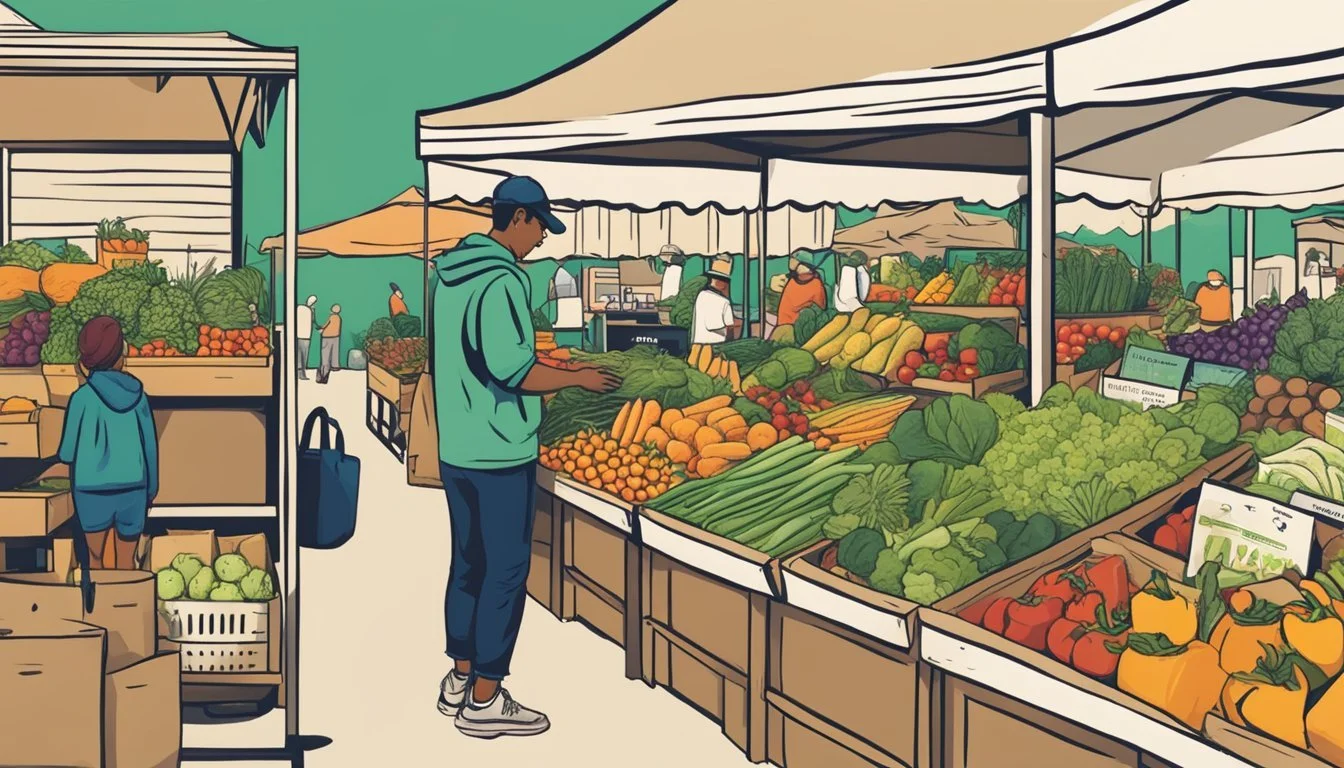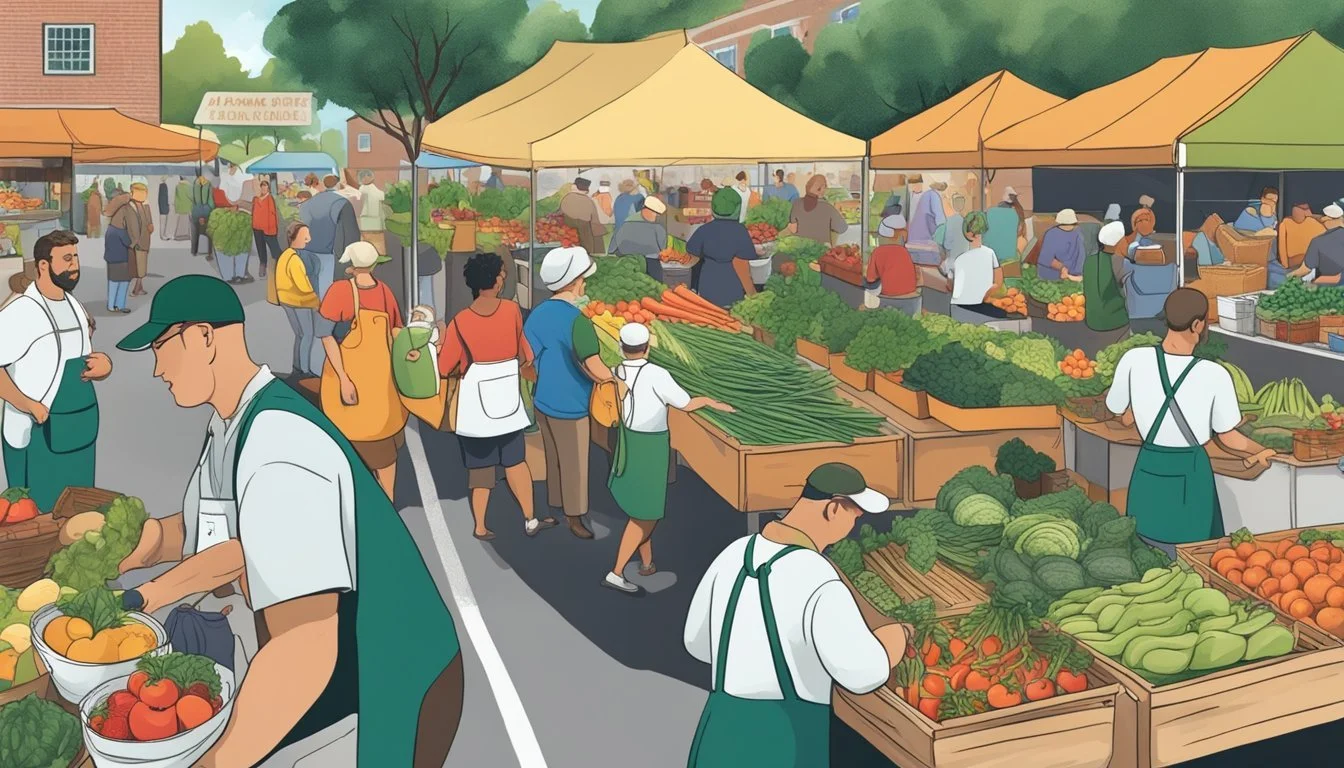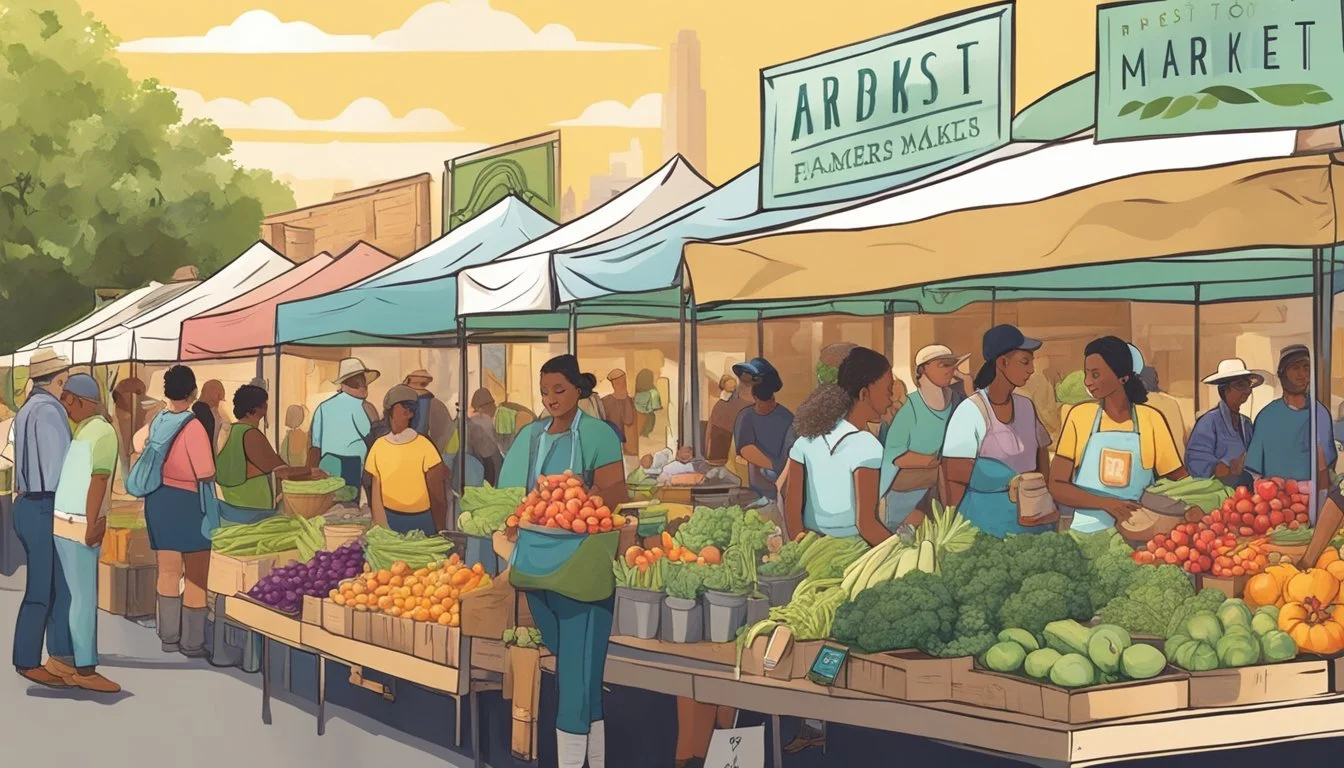Community Supported Agriculture (CSA) in Austin, TX
A Guide to Local Farm Shares
Community Supported Agriculture, commonly known as CSA, is a flourishing movement within the Austin, Texas food landscape. It represents a partnership
Understanding CSA
Community Supported Agriculture, commonly known as CSA, represents a sustainable approach to farming and food consumption, connecting local communities with the produce they consume.
History and Philosophy of CSA
CSA originated in Europe in the 1960s and made its way to the United States in the 1980s. The fundamental philosophy behind CSA is the establishment of a mutual pledge where the community supports local farming operations. This partnership is guided by principles of sustainability, organic farming, and education. It forges a symbiotic relationship where consumers receive fresh, local food, and farmers gain a dedicated customer base.
How CSA Works
In a CSA model, consumers become members by paying for a share of the anticipated harvest upfront. This financial support aids the farmer early in the season and helps mitigate some of the inherent risks of farming. Members typically receive a weekly or biweekly portion of fruits and vegetables, and sometimes additional farm products like meat or dairy.
Local CSA Examples in Austin:
Weekly Produce Shares: Customers get a mix of produce every week.
Biweekly Box Options: For those who want less frequent deliveries.
Meat and Dairy Add-ons: Some CSAs offer local, sustainably raised meat.
Benefits of Joining a CSA
Joining a CSA comes with a myriad of benefits. Members enjoy:
Access to Fresh Produce: Vegetables and fruits are often harvested the same day they reach members' hands.
Sustainable Choices: CSA agriculture typically focuses on organic farming methods, reducing the environmental impact.
Education and Community Involvement: Farms often offer programs to educate members about food production and sustainable practices.
Supporting Local Economy: Membership fees help support local farmers, contributing to the local food economy.
By participating in a CSA, members are investing in their health, community, and the environment.
CSA Options in Austin
Community Supported Agriculture in Austin offers residents an opportunity to engage with local farmers, experience organic farming, and receive fresh produce directly from the source. These CSA programs provide a direct connection between Austin's community and its surrounding agricultural landscape.
Green Gate Farms
Green Gate Farms, an established organic farm near Austin, operates a CSA program that supports local agriculture. Members of the community can subscribe to receive a weekly or biweekly share of seasonal produce. This CSA not only connects individuals with high-quality local produce but also invites them to participate in farm events.
New Leaf Agriculture
New Leaf Agriculture is known for integrating refugee workforce into its farming operations, thereby fostering a diverse community. They offer a CSA with options for different sizes of produce shares, making it accessible for individuals and families. The farm provides organically grown vegetables and emphasizes sustainable farming practices.
Good Apple
Good Apple aims to make healthy, locally sourced food accessible to all, including underserved communities in Austin. Their CSA model includes a "buy one, give one" approach, where purchasing a subscription also supports food deliveries to families facing food insecurity. They source produce from local farms, ensuring that members receive the freshest seasonal items.
Produce and Products Offered
Community Supported Agriculture (CSA) programs in Austin, TX, offer a diverse range of locally sourced, high-quality produce and products. Consumers can expect to receive fresh and organic produce, along with a variety of meats and specially crafted products, that cater to the region's seasonal availability.
Seasonal Produce
CSAs in Austin provide an assortment of vegetables and fruits that vary with the seasons. Consumers can enjoy everything from heirloom tomatoes to crisp lettuces in the summer, and root vegetables like beets and carrots during the cooler months. Many CSAs also offer herbs and flowers, adding variety to their selection.
Spring: strawberries, spinach, peas
Summer: tomatoes, peppers, melons
Fall: squash, apples, pumpkins
Winter: kale, citrus, broccoli
Meat and Dairy
CSAs in the Austin area take pride in supplying sustainably raised, organic meat and dairy products. Subscribers get access to fresh beef, pork, chicken, and sometimes even turkey or lamb, depending on the farm. Eggs from free-range chickens are also a staple. Dairy offerings can include milk, cheese, and yogurts from heritage dairy cows.
Meat: beef, pork, chicken
Dairy: milk, cheese, yogurt
Specialty Products
Aside from the standard produce and protein options, CSAs often have delicious, specialty products unique to their farms. These can range from jars of honey and homemade jams to artisanal bread and handcrafted cheeses. These products provide a unique taste of Austin's local food scene and often showcase the creativity and skills of the region's farmers.
Honey and jams
Artisanal breads and cheeses
Sustainability and Farming Practices
Community Supported Agriculture (CSA) in Austin, TX is at the forefront of integrating sustainable and environmentally friendly farming practices. These practices are geared towards preserving the ecosystem while providing high-quality produce to the community.
Organic and Sustainable Methods
In Austin's CSAs, farmers employ organic and sustainable methods to maintain soil health and reduce the environmental impact. They emphasize the use of natural fertilizers and composting to enrich the soil, shunning synthetic inputs. Cover cropping and crop rotation are key techniques to prevent soil depletion, and they help in managing pests and diseases without relying on chemical pesticides.
Permaculture in CSA
Permaculture is a cornerstone of many CSAs in Austin, with each farm often guided by its own permaculture master plan. These systems are designed to work with nature, not against it, mimicking the patterns found in natural ecosystems. Practices such as water harvesting, companion planting, and the integration of agroforestry systems contribute to a resilient and self-sustaining farm environment.
Animal Welfare Standards
Farmers in Austin's CSA programs are committed to high animal welfare standards. Livestock is typically grass-fed and raised in free-range conditions that allow animals to exhibit natural behaviors. Strategy for keeping them healthy includes antibiotic-free practices and responsible management, ensuring that meat and dairy products are not only safe but also of superior quality.
Community Involvement
Community-supported agriculture (CSA) programs in Austin, TX not only provide an avenue for fresh, local produce but also serve as a platform for active community involvement. Through volunteer opportunities, education programs, and initiatives to address food insecurity, CSAs are strengthening ties within the local community.
Volunteer Opportunities
CSAs in Austin offer residents the chance to directly engage with their local food system. Volunteers can gain hands-on experience in sustainable farming practices and contribute to the local community's well-being. Opportunities range from assisting with the harvest to helping organize community events that promote the CSA movement.
Education Programs
Education is a fundamental component of Austin's CSA programs. They often collaborate with other coalition groups to provide programs that teach members about nutrition, gardening, and the importance of sustainable agriculture. Some CSAs partner with schools, offering children and young adults a chance to learn about where their food comes from, thereby fostering a deeper connection with their environment.
CSA and Food Insecurity
To combat food insecurity, many of Austin's CSAs implement strategies to make fresh, healthy food more accessible to all community members. This can involve sliding scale payment options, donation of surplus produce to food banks, or working with medical students and professionals to educate at-risk populations about diet-related health issues. CSA's efforts in these areas show their commitment to ensuring everyone has access to quality food while supporting local farms.
Supporting Local Agriculture
In Austin, Texas, supporting local agriculture through community-supported agriculture programs fosters a direct link between consumers and regional farmers. These local initiatives bolster Central Texas's farm-to-table connection, diversifying both the agricultural landscape and the economy.
Advantages of Local Farms
Local farms provide community members with fresh, seasonal produce, often harvested within a day or two prior to delivery or pick-up. By offering shares of their anticipated harvest through CSA programs, these farms supply subscribers with a regular bounty of farm products.
Freshness: Local farms in Austin guarantee the freshest produce by minimizing the time from harvest to table.
Sustainability: They often employ more sustainable farming practices, preserving Central Texas's natural resources.
Impact on Central Texas Economy
Local farmers and their CSAs play a critical role in Central Texas's economy by creating jobs and keeping money within the community. Additionally, these farms contribute to the diversification of the agricultural sector.
Employment: Local farms generate employment within the agricultural sector and related industries.
Local Spending: Money spent on local CSA shares circulates through the local economy, benefitting other businesses and services.
Challenges Faced by Local Farmers
Despite the benefits they bring, local farmers face several challenges, including competition from larger, commercial operations and the fluctuations of consumer demand.
Competition: Big agricultural businesses can offer lower prices due to economies of scale, making it tough for small local farms to compete.
Market Demand: Local farmers must adapt to changing market demands and seasonal variations, which can affect their income stability.
Membership and Enrollment
Enrolling in a CSA program in Austin provides residents with the opportunity to receive fresh, local, and often organic produce while supporting community farmers. Below are specifics on signing up, available membership tiers, and the details of CSA shares.
How to Sign Up
Individuals interested in joining a CSA in Austin can typically sign up through a farm's website or by contacting the farm directly. Most farms offer online enrollment forms where prospective members can choose their preferred subscription, pick-up location, and start date. For example, farms such as Johnson's Backyard Garden offer sign-up options online with clear instructions for new members.
CSA Membership Tiers
CSA memberships often come in varied tiers to accommodate different household sizes and consumption needs. For instance, tiers may range from small boxes suitable for individuals to larger shares for families. Tiers could be defined as:
Individual Share: Ideal for one person
Small Share: Suitable for two people
Family Share: Best for a family
Members can usually choose between weekly or bi-weekly deliveries, reflecting the degree of flexibility CSA programs offer.
Understanding CSA Shares
A CSA share represents a portion of the farm's harvest. Shares typically consist of a variety of seasonal produce, which may include both fruits and vegetables. Organic options are common in Austin's CSA programs. Shares might look like:
Spring Share: An assortment of lettuces, radishes, and strawberries
Summer Share: A mix of tomatoes, peppers, and melons
It's important for members to understand that the quantity and variety of produce in their share depend on the farm's actual harvest, which can be influenced by factors such as weather and growing conditions.
Logistics and Distribution
Community Supported Agriculture programs in Austin provide residents with various options for receiving fresh produce and meats from local farms. The logistics and distribution systems are well-developed, offering home delivery services, convenient pick-up points, and direct connections to farmers markets.
Home Delivery Options
Home delivery has become a prominent feature of CSA programs in Austin. Companies like Lettuce deliver meal kits with no-commitment requirements, sourcing products from local farms such as Fagen Family Farms and Gundermann Acres. Subscribers can tailor delivery frequencies to their preferences, whether weekly, bi-weekly, or monthly.
Pick-Up Points
For those who prefer to collect their CSA shares, numerous pick-up points are situated throughout Austin. These are typically arranged at community spaces or even directly at the farms. Skip Connett and Erin Flynn of Green Gate Farms, for instance, offer a pick-up option for their farm shares, combining convenience with an opportunity to meet the farmers.
Farmers Market Connections
CSAs in Austin often maintain strong partnerships with farmers markets. Entities such as 44 Farms participate in local markets, allowing CSA members to pick up their shares in a market environment. This encourages support for multiple local producers and offers a dynamic shopping experience. Some CSAs also offer the flexibility to skip certain weeks, with members collecting their shares at the next farmers market.
By integrating home delivery, established pick-up points, and synergies with farmers markets, Austin's CSAs ensure accessibility and convenience for their members, while supporting local agriculture and building community connections.
Profiles of Local CSAs
Community Supported Agriculture (CSA) programs in Austin, Texas provide residents with a direct way to purchase high-quality, fresh produce from local farmers. Through seasonal subscriptions, members receive a regular supply of fruits and vegetables, simultaneously supporting local agriculture.
Johnson’s Backyard Garden
Johnson's Backyard Garden began as a family project in East Austin and has since grown into a thriving organic farm. They offer a range of CSA subscription options, providing a diverse assortment of vegetables, herbs, and fruits. Their commitment to sustainable farming practices ensures that their produce is not only fresh but also environmentally responsible.
Tecolote Farm
Established in 1994, Tecolote Farm holds the distinction of being one of the longest-operating CSAs in Texas. They focus on organic farming techniques, carefully cultivating a variety of seasonal products. Members of Tecolote Farm's CSA enjoy a weekly selection of fresh, organic produce, often harvested just hours before delivery.
VRDNT Farm
VRDNT Farm, pronounced as "verdant," lives up to its name by producing a vibrant array of vegetables. Despite being a relatively new player in the local food scene, VRDNT Farm has quickly established a reputation for their high-quality, sustainably-grown produce. Their CSA members benefit from this dedication to quality, receiving fresh, seasonally curated vegetables throughout the year.
Selecting the Right CSA
When examining Community Supported Agriculture (CSA) options in Austin, TX, potential members should scrutinize the freshness, variety, and sources of the produce, as well as the cost structure of the programs available. Factoring in these considerations can lead to a more satisfying CSA experience.
Tips for New Members
New members should start by identifying CSAs that prioritize local food and fresh offerings. It's beneficial to join a CSA where the distance between the farm and your home is minimal, thereby ensuring that the produce retains its freshness upon delivery. Additionally, inquiring about delivery frequency options such as weekly or bi-weekly, as outlined by local services like Lettuce and community farms, can help tailor the CSA experience to personal schedules.
Research: Look into each CSA's operation and the variety of produce offered.
Accessibility: Consider the pick-up locations or delivery areas.
Flexibility: Evaluate the level of commitment required; some CSAs offer one-time orders or flexible subscriptions.
Assessing Quality and Variety
When investigating CSAs, it's essential to assess the quality and variety of the organic produce they offer. High-quality CSAs in Austin often boast a broad spectrum of fruits, vegetables, and additional products such as meats and dairy, sourced from farms like Finca Pura Vida and Gundermann Acres. These establishments may provide details on heirloom and heritage varieties, which can be indicative of a commitment to preserving biodiversity and offering unique palates of flavors.
Product Range: Ascertain the scope of offerings, including any unique or heritage varieties.
Growing Practices: Familiarize oneself with their farming methodologies—whether they are organic, conventional, or employ integrated pest management.
Cost Considerations
Lastly, cost is a critical factor for CSA members. The CSA model generally operates on a seasonal subscription basis, with some farms in Austin offering flexible financial commitments. Members should expect upfront costs but also consider the long-term savings associated with consistent, high-quality produce. As the CSA model supports and bolsters local farmers directly, it's also an investment in the community's sustainability.
Subscription Fees: Understand the initial investment and what it entails over the course of the season.
Payment Plans: Check if there are options for installment payments or financial assistance programs.
By examining these factors, those interested can choose a CSA in Austin that aligns with their values, promotes a healthy lifestyle, and encourages the enjoyment of fresh, locally-grown produce.
Beyond Produce
The landscape of Community Supported Agriculture in Austin extends beyond vegetables and fruits, encompassing a variety of other products that cater to diverse consumer interests and ethical consumption practices.
Flower and Herb CSAs
In Austin, some CSAs offer seasonal flowers and a vast array of herbs that are grown with the same commitment to sustainability as their produce counterparts. These CSAs allow members to receive fresh bouquets and aromatic herbs, adding aesthetic and culinary value to their weekly bounty.
Integrated Livestock Operations
Grass-fed beef and pastured pork from integrated livestock operations are also available through Austin's CSA programs. Farms raise pigs and cattle with a focus on ethical practices, ensuring that animals are treated humanely and fed natural diets. Consumers benefit by receiving high-quality meats known for their flavor and nutritional value.
Grass-Fed Beef: Locally-raised with no hormones or unnecessary antibiotics.
Pigs: Sustainably raised and known for their rich, succulent taste.
Additional Food Services
CSA offerings in Austin sometimes include additional services like meal kit deliveries. These services provide customers with the convenience of having all the ingredients they need for a meal, sourced directly from local farms and producers.
Duck: CSAs may include duck meat, valued for its rich flavor.
Guinea Fowl: A unique poultry offering that can occasionally be found in CSA boxes.
Through these expanded services, Austin's CSAs create a comprehensive food system that supports local farmers and provides residents with an array of high-quality, sustainable food options.
Educational Resources
Community Supported Agriculture (CSA) in Austin, TX not only bridges the gap between local residents and farmers but also serves as a vital educational resource. Through various programs, individuals gain invaluable insights into sustainable food systems, farming practices, and permaculture principles.
Workshops and Tours
CSAs in Austin typically offer workshops and farm tours that provide members and non-members the opportunity to learn about organic farming and sustainable agriculture first-hand. Participants can experience how local food is grown and gain practical knowledge on implementing these practices in their own gardens.
Workshops may cover topics like:
Organic pest control
Composting techniques
Seasonal planting guides
Farm tours provide insights into:
Soil health management
Water conservation methods
Crop rotation and biodiversity
Community Resources
The CSA programs in Austin act as pivotal community resources. They not only facilitate the distribution of fresh, locally-grown produce but also educate members on the importance of supporting local agriculture. Many CSAs maintain a library of materials related to sustainable farming and community supported agriculture, available to the community.
Materials often include:
Books on permaculture design
Guides to local edible plants
Literature on the benefits of CSA membership
Special Programs for Members
CSA members in Austin have the chance to participate in special programs that dive deeper into agricultural education and sustainable food systems. These programs might focus on the economics of local farming or the environmental impact of food choices.
Special programs might feature:
Seasonal cooking classes using CSA produce
Discussions on food justice and community initiatives
Collaborative events with local schools and educational institutions
By fostering an environment of learning and growth, CSAs in Austin empower individuals with the knowledge to make informed decisions regarding their food and support systems that prioritize sustainable and ethical agricultural practices.
Recipes and Cooking Tips
Community Supported Agriculture (CSA) programs in Austin, Texas not only provide an assortment of fresh, local produce to their subscribers but also offer creative ways to utilize their seasonal bounty. CSA farms often share recipes and cooking tips directly crafted to complement their produce selection, ensuring that members have the know-how to enjoy the full gastronomic potential of their shares.
Using Seasonal Produce
Subscribers of CSAs in the Austin area receive a variety of seasonal produce that reflects the region's growing cycles. To maximize the usage of this produce, it is important to:
Understand what is in season when creating meal plans.
Be adaptable with recipes to incorporate the fresh items available that week.
Seasonal Spring Produce in Austin:
Fruits: strawberries, loquats
Vegetables: spinach, carrots, radishes, kale
Preserving Your Share
Preservation allows for extending the enjoyment of CSA produce beyond its peak freshness. Key methods include:
Canning: suitable for fruits, some vegetables, jams, and sauces.
Freezing: ideal for most berries, blanched vegetables, and herbs.
CSA-Inspired Recipes
CSA shares in Austin inspire a multitude of recipes that showcase local produce. Here are simple ways to incorporate this week's harvest into daily meals:
Simple CSA Recipe Ideas:
Strawberry and spinach salad with a balsamic reduction.
Roasted carrots and radish medley with fresh thyme.
Sautéed kale with garlic and a squeeze of lemon.
These recipes are not only designed to enhance the natural flavors of the produce but also to promote easy, nutritionally balanced meals for the CSA members and their families.
Conclusion
Community Supported Agriculture (CSA) has firmly taken root in Austin, Texas, creating a symbiosis between local farms and the community. These programs offer a sustainable food source that supports local agriculture and fosters an existing ecosystem of diversity and direct-to-consumer sales. Austin's residents can subscribe to CSAs like Munkebo Farm, Fagan Family Farm, and Sand Holler Farm, among others, which are known for their commitment to organic farming and USDA Organic certification where applicable.
CSAs provide consumers with a sense of connection to their food sources, delivering seasonal produce directly from the farmhouse to the doorstep. Farmhouse Delivery and Vinder are examples of services that have leveraged this model to enhance the accessibility of fresh, local products. They not only underpin a sustainable business model for farmers but also allow consumers to partake in a system that values ecological balance.
Austin's CSA programs signify more than just an exchange of goods; they symbolize a shared responsibility and investment in a healthier future for both the land and its inhabitants. Through these initiatives, Austin is nurturing a community that values and prioritizes the integrity of its food, from seed to table.

